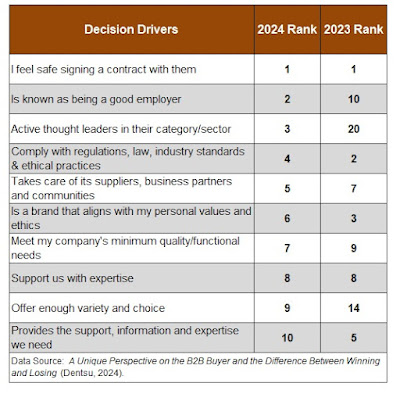Dentsu, the global provider of marketing and agency services, recently published the 2024 update to its Superpowers Index study. Dentsu has conducted this research annually since 2021, and the firm says it now constitutes the "largest ever systematic study of B2B buying behavior globally."
The 2024 update was based on interviews with 3,528 B2B buyers covering 6,539 buying experiences. Over the four years of the study, Dentsu has interviewed over 14,000 B2B buyers about over 25,000 buying experiences.
The Dentsu research had three primary objectives. It sought to identify:
- The drivers behind B2B buying decisions
- Who is involved in the buying process and what makes a difference to buyers at each stage
- How improving the buying experience impacts commercial outcomes
The Resurgence of Brand
One of the most notable findings from the 2024 research is that "personal" decision drivers have become more important to B2B buyers. This led Dentsu to assert that "Brand has never been more important in B2B."
Dentsu provided the interviewed buyers 30 decision drivers and asked them to rank the drivers based on how much influence each driver had on their buying decision. The following table shows the ten most influential decision drivers identified by buyers in 2024 and where each of those drivers ranked in the 2023 research.
As this table shows, "I feel safe signing a contract with them" was the most influential decision driver in both 2024 and 2023.
In 2024, the second and third most influential drivers were "Is known as being a good employer" and "Active thought leaders in their category/sector." Dentsu characterized both of these as "personal" drivers, and both were ranked significantly higher in 2024 than in 2023.
In the paper describing the 2024 research, Dentsu observed that ". . . for the first time since we started Superpowers, we see 'personal' decision drivers outweigh the more functional drivers in their overall importance in the B2B buyer journey."
The resurgence of brand is also reflected in the attitudes of B2B marketers. In the 2024 research, B2B marketers ranked "raising brand awareness/top of funnel performance" as the most important objective for future strategy, up from fifth place in 2023. Meanwhile, "demand generation/driving and converting leads" fell to seventh place in 2024, down from fourth place in 2023.
My Take
The relative importance of brand marketing vs. demand generation marketing (a/k/a "performance marketing") has been the topic of a long-standing debate in the B2B marketing community. A few years ago, Samuel Scott
described this divide in marketing as a "cold war." Until recently, the proponents of demand generation marketing were clearly winning the war.
For nearly two decades, most B2B marketers have been primarily focused on using data and technology to improve the performance of their demand generation programs. Not surprisingly, most of the B2B marketing research published over the past two decades has also been focused on demand gen marketing technologies and techniques.
But despite the widespread focus on demand generation marketing, brand building never completely disappeared from the conversation. Throughout this period, a cadre of respected marketing thought leaders continued to stress the importance of brand marketing in B2B, and these thought leaders' views have been consistently supported by credible research.
Here are two other research studies that provide persuasive evidence for the importance and value of B2B brand marketing.
The Bain & Co./Google Survey
In 2022, Bain & Co. and Google surveyed 1,208 people at U.S. companies who were involved in buying several kinds of business products and services. From 80% to 90% of the survey respondents said they had a set of vendors in mind before they did any research. And, 90% of those respondents said they ultimately chose a vendor that was on their day-one list.
The WSJ Intelligence/B2B International Survey
In
a 2021 survey of 1,601 business decision-makers by WSJ Intelligence and B2B International, researchers asked participants to think about a recent purchase and reflect on the vendor that was ultimately selected (the
winning vendor) and on a vendor that was considered but not selected (the
losing vendor).
The survey found that the mental impressions buyers have about potential vendors before they begin an active buyer process have a significant impact on purchase decisions. Specifically:
- Survey respondents were more than twice as likely (79% vs 37%) to say they were very familiar with the winning vendor versus the losing vendor before their active buying process began.
- Respondents also said they had a higher level of trust (57% vs 37%) and confidence (52% vs. 37%) in the winning vendor versus the losing vendor before they started their buying process.
*****
So, is B2B brand marketing making a comeback? I think the answer to this question is "Yes," but its too soon to tell how much of a comeback.
Les Binet and Peter Field have argued that B2B companies should spend 46% of their marketing budget on long-term brand-building programs. I suspect few, if any, B2B companies are spending at that level, but I don't doubt that astute B2B marketers are increasing their investment in brand marketing.






No comments:
Post a Comment